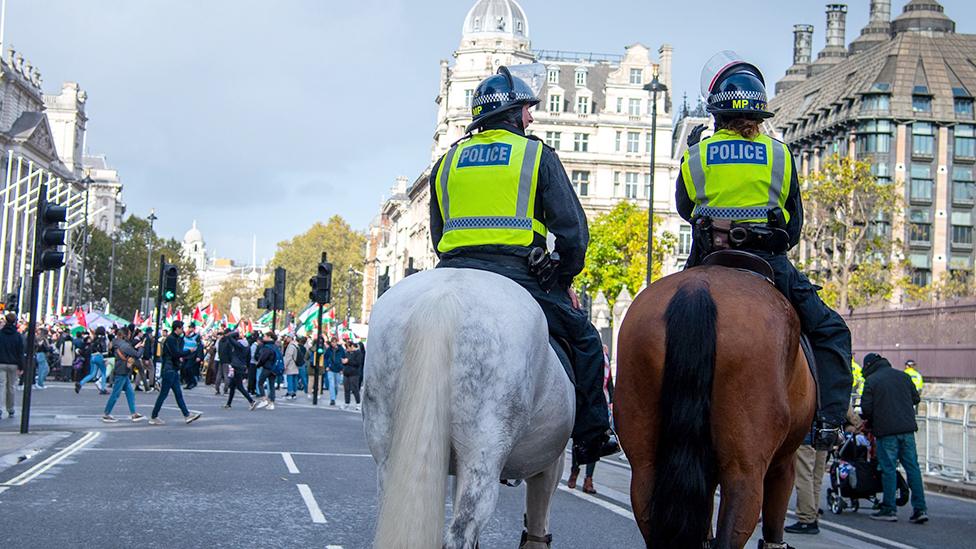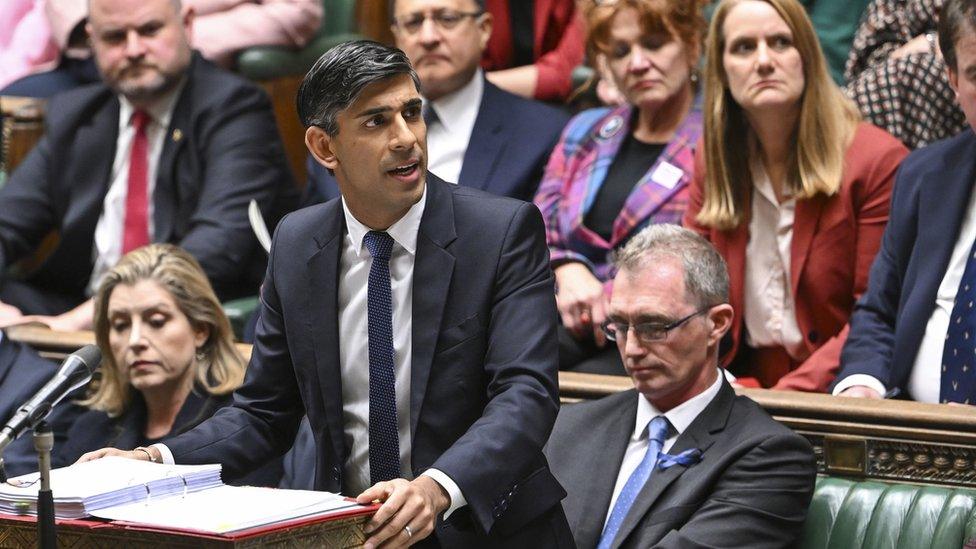Pro-Palestinian protests: Met Commissioner calls for clarity
- Published

The protests in London have been mostly peaceful
Met Police Commissioner Sir Mark Rowley has called for clarity from the government on extremism, as he faces criticism over the handling of pro-Palestinian protests in London.
Five people have been charged after being arrested at the demonstrations in central London on Saturday.
The home secretary urged a "zero-tolerance approach to antisemitism".
Sir Mark said about 100 people had been arrested at protests since the Hamas attack on Israel three weeks ago.
He added that "many more" arrests are expected in the near future.
Nine people were arrested in central London during a mainly peaceful pro-Palestinian demonstration on Saturday, which was attended by at least 100,000 people calling for a ceasefire in the Israel-Hamas war.
Responding to Sir Mark's comments, Ms Braverman said some people who were protesting were "chanting for the erasure of Israel".
She said police were concerned about a "large number of bad actors deliberately operating beneath the criminal threshold" at the protests.
Noting that police and Crown Prosecution Service are operationally independent, Ms Braverman said: "They need to make those decisions based on the facts and evidence as they see them. But I have made my views clear, these are hate marches and the police must take a zero-tolerance approach to antisemitism."
Since Hamas attacked on 7 October, killing more than 1,400 people and taking at least 230 back to Gaza as hostages, Israel has responded with a retaliatory bombing campaign and ground operation.
The Hamas-run health ministry in Gaza has said more than 8,000 people have been killed as a result of Israeli attacks.
In an update on Sunday night, the Met said a 33-year-old man and a 22-year-old woman have been charged with a racially aggravated public order offence, a 51-year-old woman and a 16-year-old boy were charged with public order offences while a 41-year-old man was charged with causing actual bodily harm.
Sir Mark said his officers are limited by legal definitions of extremism and that he would support a review into the definition and how it should be policed.
"There is scope to be much sharper in how we deal with extremism within this country. The law was never designed to deal with extremism, there's a lot to do with terrorism and hate crime but we don't have a body of law that deals with extremism, and that is creating a gap."
He said lawyers from the Crown Prosecution Service are working in the police operations room to help identify offences.
"We've got these big protests and some of what goes on there, people do find it upsetting and distasteful and sometimes people give an instinctive view that must not be legal.
"But there's no point arresting hundreds of people if it's not prosecutable, that's just inflaming things.
"We will robustly enforce up to the line of the law. We're going to be absolutely ruthless, and we have been, and you'll see many more arrests over the next week or so."
Meanwhile, an education minister has said he agreed with the sentiment recently expressed by the deputy mayor of Jerusalem that London has a problem with antisemitism.
Speaking on LBC, Robert Halfon, who is Jewish, warned it is a "fearful time for Jews in the UK", adding there is also a problem of "ever-increasing incidents of antisemitism" in universities.
After Mr Sunak chaired an emergency meeting to discuss the ongoing situation and its impact on communities in the UK, a Downing Street spokesman expressed concern at an increase in antisemitic and anti-Muslim incidents.
Speaking to reporters, the PM's spokesman described videos and pictures shared on social media over the weekend as "extremely concerning" and insisted that the government was working to reassure affected communities.
Asked about calls for clarity on the definition of extremism, Downing Street said the government would look at any gaps in the law that might exist. "It's important that frontline officers feel they have certainty and clarity," the spokesman added, but he also insisted that the police did have powers to act.

More on Israel-Gaza war
Follow live: Latest updates
Watch: Video said to show Al-Quds hospital after nearby blast
Explained: What is happening in Israel and Gaza, and why now?
History behind the story: The Israel-Palestinian conflict

Listen to the best of BBC Radio London on Sounds and follow BBC London on Facebook, external, X, external and Instagram, external. Send your story ideas to hello.bbclondon@bbc.co.uk
Related topics
- Published27 October 2023

- Published23 October 2023
